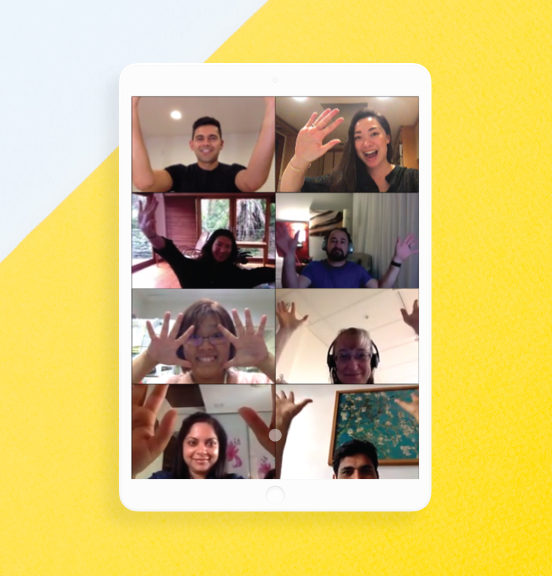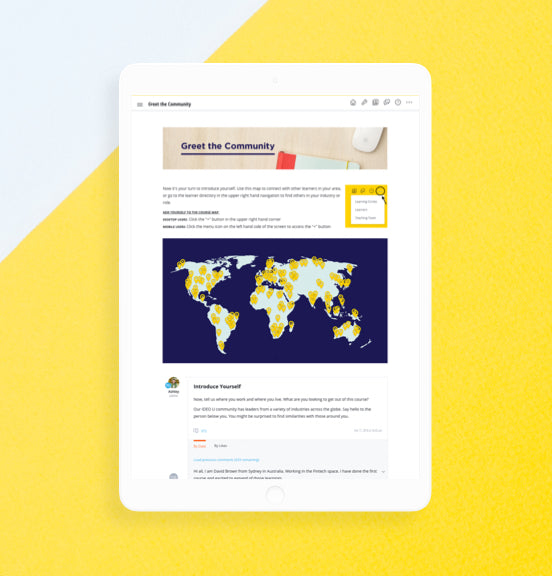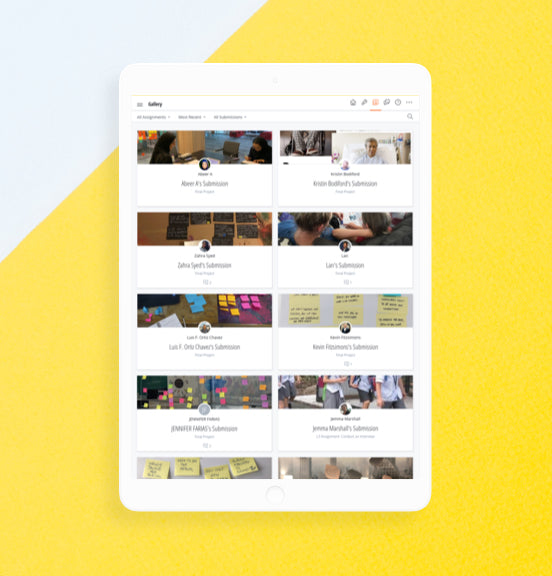

Creative Thinking for Complex Problem Solving
Creative Thinking for Complex Problem Solving
What You'll Learn
 Introduction: Welcoming Complexity
Introduction: Welcoming Complexity
Watch a sneak peek
-
Build Confidence For the Future—A sneak peek of the course
2 Video Lessons
-
Welcome Complexity: An Introduction to Mindsets and Methods—Delve into the essential components of curiosity, experimentation, and iteration to welcome complexity as an opportunity.
-
Play x Rigor: The Perfect Problem-Solving Duo—Understand how play and rigor act as powerful tools in navigating complex and dynamic spaces.
1 Assignment
-
Articulate a Complex Problem: In your organization, reflect on how play and rigor show up.
2 Discussions
-
When have you seen the power of adding more imagination or creativity into addressing a complex problem? What was the impact?
-
What common complex problem-solving pitfall tends to happen most on your team: oversimplifying, overanalyzing, or quick fixes? Why and how could you counter it?
2 Resources
-
Mindsets that Drive Complex Problem Solving: This guide provides information on embracing the mindsets of exploration, empathetic curiosity, and experimentation.
-
Overcoming Common Pitfalls: Strategies to recognize and address common pitfalls such as oversimplification, overanalysis, and premature solution finding.
 Week 1: Open Up the Problem With Curiosity
Week 1: Open Up the Problem With Curiosity
4 Video Lessons
-
Expand the Question: Engage Stakeholders and Invite Fresh Perspectives—Learn to uncover and ask the right questions by involving diverse stakeholders
-
Build Empathy: Put Humans at the Center—Apply critical thinking strategies to understand the biases and needs of stakeholders using three IDEO case studies
-
Diverge and Converge: Generate Possibilities and Make Choices—Explore IDEO’s diverge/converge process, and the powerful role ambiguity plays in problem solving
-
The Science of Play: Why Creative Problem Solving Works—Explore the neuroscience behind imagination and play, and why these concepts are so vital in problem-solving spaces.
1 Assignment
-
Refine Your Problem Statement: Reflect on and apply techniques to deconstruct assumptions, broaden perspectives, refine your central problem statement based on human needs and resources.
3 Discussions
-
What “sacred myths” are present in your organization? How might they limit creativity and innovation?
-
Does your organization oversimplify, overanalyze, or jump to solutions when facing complexity? Why?
-
How can leaders nurture acceptance of uncertainty in the innovation process?
2 Resources
-
Uncover Assumptions: Tools to help you uncover starting points, hunches, and strong beliefs about your problem.
-
Right-Size the Question: Learn how to sharpen your problem statement with lessons from IDEO case studies.
 Week 2: Get Tangible Through Experimentation
Week 2: Get Tangible Through Experimentation
4 Video Lessons
-
Level up Ideas—Techniques to evolve early hunches into tangible concepts
-
Build confidence—Learn to assess concepts using IDEO’s Desirability, Viability, and Feasibility framework
-
De-risk Through Experimentation—Learn how to use prototyping to de-risk your solutions
-
The Art of Observation—Techniques for capturing unbiased observations from your experiments
1 Assignment
-
Create Prototypes: Bring your solutions to life with rapid prototyping, uncover hidden assumptions, and build resilience in your solutions.
3 Discussions
-
What technique(s) helped you most in leveling up early ideas into testable concepts?
-
How might you increase the diversity of perspectives involved in shaping and assessing early prototypes?
-
In what ways can leaders nurture acceptance of uncertainty and nonlinearity in the early innovation process?
2 Resources
-
Tools for Prototyping and Experimentation: Guides on co-creation sessions, mock pitches, and boundary concepts.
-
Simulating Strategies and Solutions: Learn how to use strategy board games as tools for fostering problem-solving, creativity, and innovation.
 Week 3: Iterate As You Learn
Week 3: Iterate As You Learn
3 Video Lessons
-
Meaning Making: Identify Patterns and Themes Through Synthesis—Balance playful synthesis with rigorous analysis to build compelling narratives
-
Pivot and Iterate—Techniques to adapt and evolve future solutions
-
Learn from The Future—Use future scenarios to pressure-test ideas and adapt to evolving concepts
1 Assignment
-
Uncover Deep Insights: Apply the techniques of affinity clustering, stakeholder critiques, and working backward from future visioning to derive meaningful insights and identify moments to iterate or pivot.
3 Discussions
-
What metrics would indicate you are making meaningful progress amidst complexity and uncertainty?
-
What insights challenged your assumptions about this problem space or audience?
-
In what ways can experiments that “fail” still provide value in complexity?
2 Resources
-
Find the Implications from Insights: Strategies for leveraging insights in problem-solving.
-
Measure Progress: Methods to track progress and align with future scenarios.
 Conclusion: Maintain Momentum
Conclusion: Maintain Momentum
1 Video Lesson
-
Sustain Commitment—Learn how to inspire behavioral change and sustain commitment.
1 Assignment
-
Reflect on the Mindsets and Methods to Drive Sustained Change: Determine everyday rituals that motivate teams and counter change fatigue. Adopt lenses assessing current strategies while envisioning aspirational futures.
2 Discussions
-
Why is it important to define success by outcomes rather than only concrete outputs/deliverables? How might this shape your approach?
-
What everyday rituals can leaders employ to keep teams inspired and committed for the long haul of complex problem-solving?
1 Resource
-
Temperature Check: Evaluate your progress and strategize the next steps to enhance confidence in your problem-solving direction.
Meet Your Instructors
Kate Schnippering
Executive Design Director at IDEO
Kate Schnippering is an Executive Design Director at IDEO, with a focus on creative technology. Kate brings ‘build to learn' experimentation to make real the futures we imagine. She creates conditions for teams and partners to immerse in imagination as a collective act—uplifting dreams and rigor in equal measure. In nearly a decade at IDEO, Kate’s developed teams, leaders, and organizations.
Michelle Lee
Partner and Executive Managing Director at IDEO Play Lab
Michelle Lee is a Partner and Managing Director at IDEO, where she has applied her passion for play to leading interdisciplinary teams of designers and researchers in bringing engaging, interactive, and playful experiences to market. She believes in leveraging the principles of play to connect with people on a deeper emotional level that captivates, delights, and empowers.
Frequently Asked Questions
We offer three types of courses: self-paced courses, cohort courses, and certificate programs. Cohort courses run on a set calendar, with fixed start and end dates. Course learning is self-paced within those dates and requires approximately 4-5 hours per week over 5 weeks. Courses consist of videos, activities, assignments, access to course teaching teams, and feedback from a global community of learners. There are also optional 1-hour video Community Conversations, held weekly by the teaching team.
All of our cohort courses are fully online, so you can take them from any time zone, anywhere in the world. With our cohort course experience, while you'll be learning alongside other learners, you'll still have the flexibility to work at the pace that fits your own schedule. There aren’t mandatory live components, so you don't have to worry about having to log in at a specific time. At the same time, you'll have access to a teaching team, which is composed of experts in the field who are there to provide you feedback, and there are also plenty of options to connect with your fellow learners.
Course instructors have a strong presence in the courses through the course videos, but they're not actively providing feedback or holding direct conversations with our learners. We have a teaching team to ensure that you have the feedback, guidance, and support you need to learn successfully in your course. Our teaching team members are design practitioners that have experience applying course methods and mindsets in a wide variety of contexts around the world.
Our teaching team consists of teaching leads and teaching assistants, who are experts in their fields. Many of them have been with IDEO U for many years, and we have selected those who have direct experience with applying the course methods and mindsets in all sorts of contexts around the world. They all go through multiple training sessions by our instructional designers on not only on the subject matter, but also on how to create safe and collaborative learning experiences and environments.
Community Conversations are one-hour live video conversations hosted by the teaching team on Zoom. These happen once per week, with each one having two to three time options to accommodate different time zones. Each week focuses on the lesson that you’ve just gone through, so the output and the content depend on the specific lessons. You'll have the opportunity if you work together with your peers on the tools and mindsets from the course, reflect on what you’ve learned, and also address any challenges that you might be going through.
All course materials, including videos, activities, and assignments will be available while you are enrolled in a course. During the 5 weeks of the course, you will have full access to our learning platform and can refer back to it any time. You will only have access to the course materials while you are enrolled.
Assignments must be submitted during the 5-week course duration in order for you to receive a certificate of completion.
Absolutely! We have had many teams go through our courses together. For those taking our courses as a team, we provide a number of additional benefits:
1. A Team Learning Guide, developed to provide your team with resources to facilitate offline discussions that complement the in-course experience.
2. A Manage Learners function, which provides visibility into your team's progress within the course.
3. The ability to create a private Learning Circle, which is a closed space for discussion on the learning platform specifically for your team.
For more information, visit our Team Learning page.
We offer a discount when you enroll in multiple courses at the same time through some of our certificate programs, including Foundations in Design Thinking, Business Innovation, Human-Centered Strategy, and Communicating for Impact.
You can also enter your email address at the bottom of this page in order to receive updates on future offers or possible discounts.
After completing a cohort course, you will be able to add it to your “licenses and certifications” on LinkedIn.
We also have certificate programs that consist of multiple courses. After completing a certificate, you will receive a certificate of completion via email as a downloadable PDF within 1-2 weeks of completing the final required course. Certificates are configured for uploading and sharing on LinkedIn.
You can purchase a course on our website using a credit card, PayPal, or Shop Pay. For US customers, we also offer installment plans at checkout if you use the Shop Pay method of payment.
We typically are not able to accommodate bank transfer or invoicing. However, if your order includes 10 seats or more, please contact hello@ideou.com and our team will be happy to review your request.
Collaborate with a Global Community
Work with Expert Coaches
Our teaching team has extensive applied industry knowledge. They'll help deepen your understanding and application of the course content by facilitating written discussions, live video moments, and assignment feedback.
Expand Your Network
Join virtual live discussion groups for deeper conversation, reflection, and connection led by teaching team members and available multiple times a week across time zones.
Receive Feedback
Gain tips, techniques, and a downloadable feedback guide; and share and receive feedback on assignments from peers.



Loved by Learners Across the Globe
Creative Thinking for Complex Problem Solving
Cohort Course“Michelle has a passion for thinking BIG, addressing complexity with playful creativity, and somehow making it all fun! She understands deeply the importance and implications of play across contexts, industries, and solutions - and uses it masterfully in her own work and in helping others come up with solutions and innovations. I would 100% choose her as my teacher and mentor in this space every time - and have!”
Creative Thinking for Complex Problem Solving
Cohort Course"Kate and her team brought people together from across the Ranger Business to engage in complex strategy development through a playful and curious program of work. With prototypes and ideas in hand, we explored new places and met new people, growing and learning together as a team. These glimpses into the future continue to inspire us, have changed our approach to work and compel us to continuously adjust and refine our Ranger strategy to support future generations."
Learners Also Purchased
-
Human-Centered Systems Thinking Course
A holistic approach to problem solving starts with peopleCohort Course 5 Weeks- Regular price
- $799
- Sale price
- $799
- Unit price
- per
-
Foundations in Design Thinking Certificate
Learn the core skills and mindsets of design thinkingCertificate Program 2-3 Months- Regular price
- $1,498
- Sale price
- $1,498
- Unit price
- per
-
Designing Strategy
Unite rigor and creativity to create a successful strategyCohort Course 5 Weeks- Regular price
- $799
- Sale price
- $799
- Unit price
- per

Enroll As a Team
The practice and application of design thinking, innovation, and creativity is highly collaborative and team based—which is why we believe that learning is better together. Take a course as a team and develop new skills and mindsets, have deeper discussion during course kickoff and debrief sessions, and build a shared understanding.






